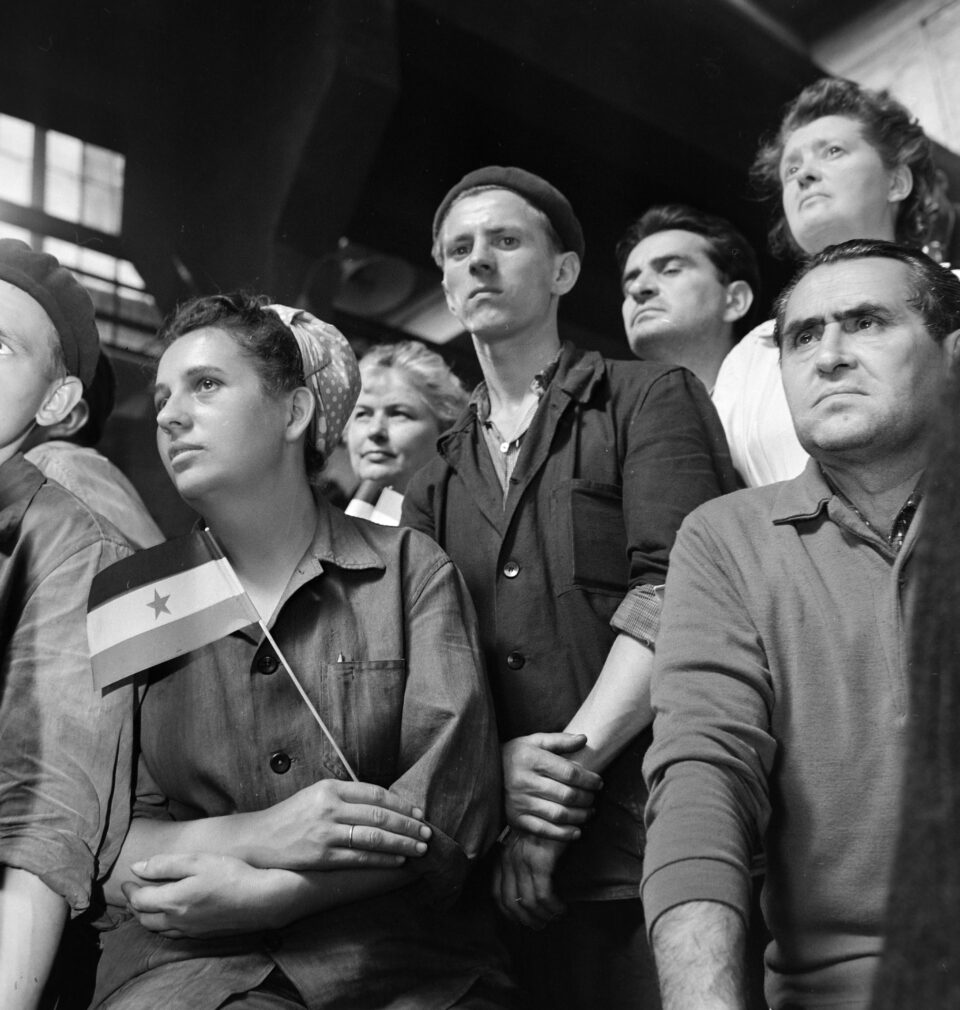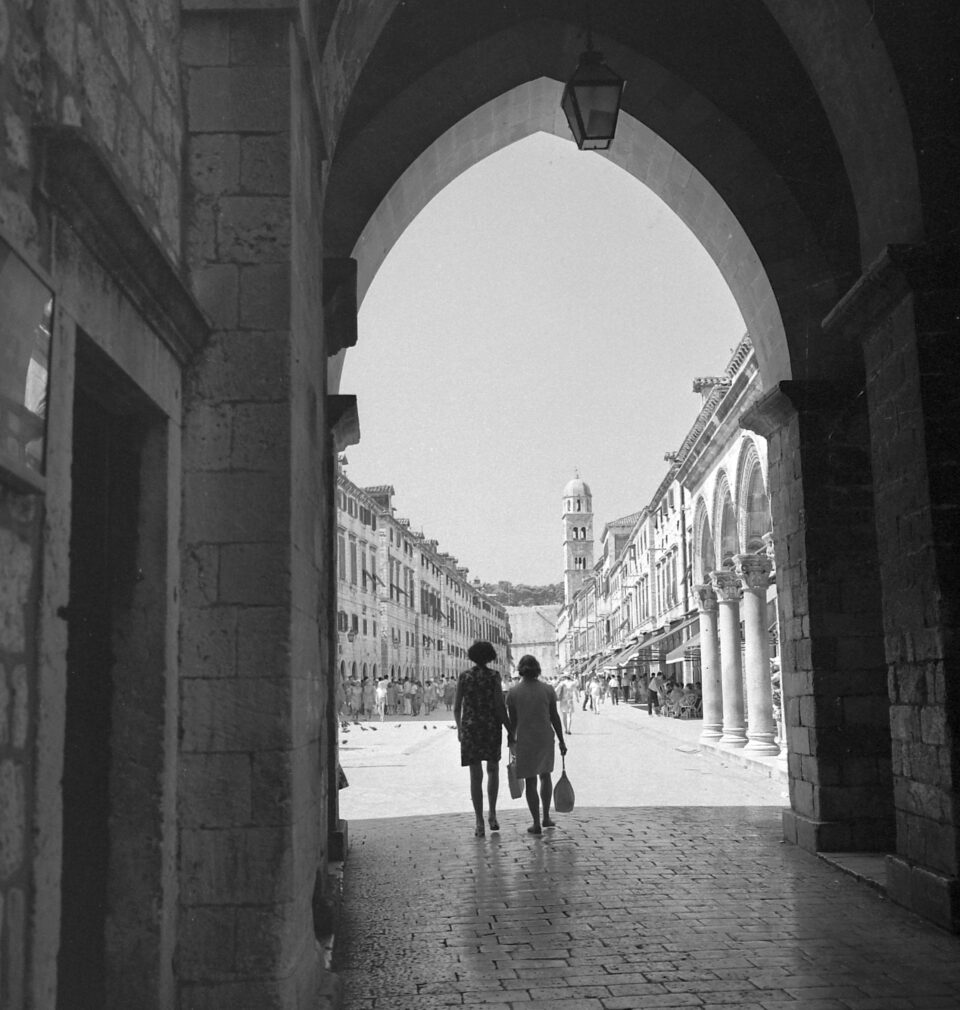
Croatia in Europe
The Yugoslavian Idea Before and After Yugoslavia
Publication: 14 October 2021
TAGS FOR THE ARTICLE
TO THE LIST OF ARTICLESIf the European federation accomplished its objectives, then apart from what has already been achieved in Yugoslavia, together with other South Slavic countries we could gain something much better: modern and permanent relations with the world, and access to universal human heritage, which does not diminish anyone’s individuality or independence.
Once, the Yugoslavian idea used to be the main guideline leading the South Slavs through the wilderness of history, and occasionally lighting up the surrounding darkness. It kept emerging, developing, and then fading away – both as a cultural-political and a state-building concept. It gave hope that we might be free, independent and stronger than under the yoke of foreign rule. The way in which Yugoslavia disintegrated and the consequences of the fact, irrevocably pushed the idea into oblivion.
However, it remains imprinted in the memory of many of its citizens.
Many people today profess that life used to be better during the times of Yugoslavia. In the 1970s and 1980s the standard of living was relatively high, unemployment barely visible, social security omnipresent, retirement secured, education free, and medical care accessible for everybody. In spite of many limitations, we, the South Slavs, enjoyed a much more comfortable existence than the Eastern European countries, which groaned under the yoke of Stalinist totalitarian regimes. Year after year the situation kept improving, with confidence and mobilisation growing. Artistic activity expressed a variety of opinions and was open to different tendencies. Some of the topics were officially branded as incorrect, but it was usually possible to find a way to bypass censorship or outwit it. The number of banned topics kept decreasing over the years. Punishment would be imposed mostly on the critics of the regime and state ideology. The majority of the artists would not have to worry about their material well-being, some getting support from various institutions or commissions, which offered cooperation and rendered necessary assistance, once some certain, yet not too harsh, conditions were fulfilled.
Yugoslavia perished due to a conflict which had been growing for a long time and eventually surfaced in the early 1990s. And as it seems, it perished irrevocably. Any attempt to create a new country of the South Slavs seems today impossible and unrealistic. No one claims responsibility for what happened, neither in the material, moral or historic sense. It is hard to accept one’s own faults. All the parties involved in the conflict try to minimise their responsibility, and highlight or blow up the involvement of others.
Everybody claims that the responsible party is “them”.
In the circumstances following the disintegration of Yugoslavia, we were confronted with the forfeiture of property and mass-scale corruption in many spheres of life, with unprecedented privatisation, debts which we cannot pay, unemployment growing every day and mostly affecting the younger generation. Unfortunately, there is no return to the past, although it would be wrong to assume that the harsh judgment is an appeal to recreate the brutally destroyed Yugoslavian state. Had, however, in spite of all the odds, common sense prevailed at the right moment, and if we had been more lucky, it would have been possible to avoid the worse – that dreadful loss of human life. The foundations shook, the walls crumbled, the roof collapsed, and the building fell down. Crying over spilled milk will not help; we cannot reconstruct what has been ruined or return to the irrevocably lost past.
At present very few people publicly refer to their Yugoslavian experience, for fear of being labelled a “yugonostalgist”, or to avoid accusations formulated by the most extreme group of nationalists. Critical opinions on the past and history are encountered with a lack of understanding, or even distrust. Especially suspicious are those who are inclined to recall positive experiences of the past epoch. Instead of the name “Yugoslavia”, more and more often one can hear the term “region”. Which region is meant exactly? Where would it be located?
We need to admit that in spite of the unfavourable conditions, some effort is made in the domain of culture (however cautious and not too frequent), proving that acceptance of the new borders and overcoming unnecessary limitations may lead to civilised communication and cooperation, to the benefit of all of the parties involved. Free circulation of thought and contacts are possible without undermining anybody’s identity or autonomy. To the contrary – they may stimulate an inspirational flow of ideas and intensify the sharing of experience. Such aspirations need to be cleared of superstition rooted in the cultures of small nations. “Our art will become national only when it becomes European” – declared Antun Gustav Matoš[1] a long time ago. A similar attitude was also demonstrated by other important artists working in various South Slavic environments. Once, Krleža[2] quoted examples of a “continuous and persistent ascent and development of South Slavic cultural consciousness, which does not contain itself exclusively to individual regions or provinces, but glowing faintly under the burden of reality across the whole country and not going out even for a moment, burns as the only moral light and joy”. These fragments were written a long time before the crisis of the Yugoslavian commonwealth broke out. Do we really have to disavow and hide such ideas only to satisfy the outdated nationalistic ideology? Cannot we treat South Slavic cultures in the same way as the Nordic, Central European or Latin American cultures are treated, without depriving any of them of even the smallest share of their autonomy?
There aren’t many cultures like the Croatian culture, which (particularly in the times of captivity) opened to the people from the outside. They found within it their own place, becoming both the torchbearers and promoters of its development. Foreign names include: Strossmayer, Šenoa, Gaj, Demeter, Štoos, Vraz, Zajc, Lisinski, Šulek, Bukovac (his true name was Faggione), Medulić (Mendola), Papandopulo, Gavella, Ružička (our first Nobel Prize winner of Czech descent) or Sorkočević (Sorgo – coming from an Albanian family selling sorgo in Dubrovnik)[3], etc. The forgotten Harambašić, similarly to Tesla, Preradović or Desnica[4] are of Serbian origin. The list could be extended and completed. It seems that it pledges us to “ecumenical openness”, which in Croatian culture is authorised and sanctioned by the listed personalities. Each represents ideas contrary to the attitude of those who cannot liberate themselves from vain self-admiration and provinciality. As early as in 1890, Vatroslav Jagić came up with this conclusion and told Franjo Rački[5]: “The less one studies and knows, the more ardent a Croat or Serb one is.”
Those who always so easily accuse others of anything that is bad in Yugoslavia or highlight everything that went wrong to demonstrate the weakness of the country, have to admit, however, that it was the Croatian Illyrian movement – the Croatian national revival, which paved the way for the “idea of Yugoslavia”. The acknowledgement of certain facts verified by history does not imply necessity to abandon one’s national identity or renounce one’s nation or country. When the Serbian Academy of Sciences and Art was established in Belgrade, and its Slovenian counterpart in Ljubljana, the Croatian Academy of Science and Art was created in 1866 in Zagreb. The Croatian anthem was composed by Josip Runjanin – a Serb from Croatia. Josip Jelačić was raised to the title of ban in 1848 by Josip Rajačić[6], the Patriarch of the Serbian Orthodox Church. On the other hand, the term “Yugoslavia” was coined in the middle of the 19th century by Matija Ban, an almost forgotten poet from Dubrovnik, who used it in a letter to Prince Alexander Karađorđević[7]. The Serbian idea of Piedmont as the motherland of South Slavs, around which they would unite, was not foreign to the educated Croatian intelligentsia. Also the unfortunate Organization of Yugoslav Nationalists (Organizacija jugoslavenskih nacionalista, ORJUNA), of which we should not be proud, who supported the Karađorđević dynasty, was born on our territory, mainly in Dalmatia. Various circles make a lot of more or less groundless and bitter accusations against our former country and the Yugoslavian commonwealth. Before we decide to blame others, we should assess our own input into what was right and what was wrong. In practice, this proves to be a painful and difficult task. It is worth remembering that Serbia had its own state before the unification of Yugoslavia in 1918 and paid a heavy price for it, with great loss of life, and an immense amount of suffering. Thus, Serbia viewed the idea in a different way than the Croats or Slovenians.
The past requires that we look at our historic experience without prejudice, especially when we encourage reflection upon the problems of nations and states, and the ties and alliances among them. Czechs and Slovaks divorced only relatively recently, although the unquestioned authority of Václav Havel tried hard to dissuade them from doing so; Russians and Ukrainians are moving further and further apart, and the only thing which still unites them is gas; Spaniards and Catalans are also heading in the opposite directions – their shared state barely keeps them together within common borders; Flemings and Walloons strive to form a shared government (just like our Serbs, Croats and Bosniaks of Bosnia-Herzegovina); the Scots and the English are at the verge of separation; which is also a dream of the Welsh and the Irish; Montenegrins bade farewell to Serbs, suddenly and unexpectedly, but not without problems; Swedes and Norwegians did the same long time ago, calmly and rationally – some wiping away tears from their eyes in parliament, others raising toasts to the occasion with a glass of champagne; Germans and Austrians have divided twice within one century; the French-speaking Quebec more and more distinctly stresses its difference from the English-speaking Canada, Padania threatens Italy with separation. Damn it! In the epoch of the multidimensional crisis of the contemporary world (including Europe, Croatia, and the “region” of our South Slavic brothers), this phenomenon requires some reflection. It should neither be overestimated nor depreciated, but rather properly ranked. It is also necessary to look at the opportunities brought about by modern times, and to find one’s own place and a sense of one’s existence in the world. We missed this type of reflection at the moment when we insanely let ourselves get involved in our last war – let’s hope the last one.
Meanings ascribed to the Yugoslavian idea in various historic periods were remarkably diverse. In the 19th century and at the beginning of the 20th century it was based on the foundation of Slavophilic ideology, and in particular on the concepts born in Prague, with which the Croatians were thoroughly familiar (Russia before October 1917 was really a pan-Slavic reference point, rather than any actual exemplar, in spite of the inspiration which we received in bequest from Juraj Križanić[8]). As a consequence of political unification, the Yugoslavian idea received a national-legal sanction, whereas the ideology supporting it leant towards integralism. The assassinations of Stjepan Radić[9] in Belgrade and King Alexander in Marseille, deeply shook the already flimsy union which broke apart during the Second World War, leaving tragic memories of that period. Resistance against Fascism and settlement with the Ustashe and Chetnik movements, introduced Yugoslavism of a different kind into the historic scene, sanctioned by the decisions of the Anti-Fascist Council of the People’s Liberation of Yugoslavia (Antifašističko veće narodnog oslobodjenja Jugoslavije, AVNOJ), and after the Second World War, by the federation organisation of the country. Such an idea formulated a common attitude and allowed us to part with Stalin and the Soviet Union. It let us also acknowledge the autonomy of the individual nations (in the language of that time – “nationalities”), such as the Macedonian nation, Montenegrin, the Muslim nation in Bosnia (today’s Bosniaks), as well as other minorities, including the Albanian minority in Kosovo. In effect, after the cessation of clashes and persecution, a Serbian minority was established in Croatia. It is obvious that the Yugoslavian idea meant something quite different in each of the above-mentioned historic periods. Thus, identifying its recent form with earlier concepts, or the last phase of its existence with the first ones, would be a mistake.
The Yugoslavian idea does not have to necessarily assume a state or national concept, but at the same time it should not decline or eliminate the common heritage of the past and history, in which former generations saw the ideas and ideals which united them, and a reason to share hope, bitter failures, delights and disappointments. The South Slavic and Yugoslavian concept used to be a firm point upon which our development and hope of survival pivoted. But they are no longer.
Most strikingly “Yugonostagia” manifests itself among the small nations of the former Yugoslavia. It is endorsed by the children of mixed marriages: Who on earth are you, born of a Croat father and a Serbian mother (as was the case of the “father of the nation,” Ante Starčević[10], who applied for the post of a teacher in a Serbian school in Zagreb)? And what if your father is a Serb, and your mother a Croat? Do you have to defy your own self? I feel regret when I look at my friends, members of the old and new Serbian minority, who disapprove of the signs of nationalism in their neighbourhood.
The times of crisis do not offer any new solutions in terms of relations among the nations which co-existed within one country not too long ago. The European Union, which accepted Slovenia and is now accepting Croatia, liquidates rigid frontiers between the member states, encourages them to find proper means and forms of cooperation in the sphere of culture, politics and economy. Establishing these type of contacts has nothing to do with the old Unitarianism (with which the ideologues try to scare us and attract new political clientele), nor with any attempts at assimilation. Providing the European federation accomplishes its objectives, then apart from what has already been achieved in Yugoslavia, together with other South Slavic countries we could gain something much better: modern and permanent relations with the world, and access to universal human heritage, which does not diminish anyone’s individuality or independence.
I am not writing this to find consolation or excuses. I have nothing to console me, and I do not intend to offer apologies. The Yugoslavian idea did not receive any good opinion on the pages of our history. What remained of it can be used within the European structures better than before. Yugoslavia won respect in international relations first of all thanks to its fight against Fascism, resistance against Stalinism and thanks to the Non-Aligned Movement (NAM), which gathered over a billion inhabitants of our planet. Our country has played a really important role in that union, more important than any other time in the history of South Slavs.
Throwing it all away as rubbish or pushing it to the margin of history is harmful and vile. History may punish anyone who tries to do so.
***
[1] Antun Gustav Matoš (1873–1914) – a prose writer and poet of Croatian modernism, and literary critic. He greatly influenced modernist poetics in Croatian literature. He supported the Croatian Party of Rights involved in the independence movement (all footnotes added by the Polish translator).
[2] Miroslav Krleža (1893–1981) – the most prolific Croatian writer of the 20th century (wrote over 50 books), and one of the most prominent representatives of Croatian literature. His prodigious output embraced all literary genres; including some breakthrough essays, and fierce criticism of the local culture and literature. Throughout his whole life he remained faithful to the leftist ideology, keeping close contact with Josip Broz-Tito. Matvejević is the author of the legendary conversations with Krleža.
[3] Josip Juraj Strossmayer (1815–1905) – A Catholic bishop, culture activist, the biggest patron of the arts in the history of Croatian culture; creator of the Academy of Sciences and Arts and the University of Zagreb; advocate of the Yugoslavian idea – the so called Croatian Tuscany, aimed at unification of the South Slavs around Zagreb, propagator of unification of Christian churches under the auspices of the Vatican; active participant of the First Vatican Council
August Šenoa (1838–1881) – the most prominent Croatian writer of the 19th century, essayist, eulogist of the city of Zagreb; author of historical novels and short stories.
Ljudevit Gaj (1809–1872) – politician and linguist, leader of the Croatian national revival – the Illyrian movement, advocate of unification of Croatian lands and the territory of all South Slavs; created foundations of the modern literary Croatian language and codified its written form.
Dimitrija Demeter (1811–1872) – poet, playwright, translator and culture activist of the Illyrian movement; contributed to the development of Croatian theatre.
Pavao Štoos (1806–1862) – poet, Catholic priest, culture activist of the Illyrian movement.
Stanko Vraz (1810–1851) – Slovenian by birth, poet and translator of classical literature and Slavic literature, literary critic, culture activist of the Illyrian movement.
Ivan Zajc (1832–1914) – conductor and composer, author of operas praising national heroes.
Vatroslav Lisinski (1819–1854) – composer.
Boguslav Šulek (1816–1895) – Slovak by birth, linguist, historian and lexicographer.
Vlaho Bukovac (1855–1922) – painter, exceptional portraitist, author of historical scenes.
Andrija Medulić Sciavone (ok. 1510–1563) – Renaissance and Mannerist painter.
Boris Papandopulo (1906–1991) – conductor and composer.
Branko Gavella (1885–1962) – theatre director, theatrologist.
Lavoslav Ružička (1887–1976) – chemist, Nobel-prize-winner.
Sorkočević (Sorgo) – one of the most prominent families of the Dubrovnik patriciate.
[4] August Harambašić (1861–1911) – writer, journalist, politician, member of the Orthodox Church; supporter of the Croatian Party of Rights.
Nikola Tesla (1856–1943) – world-famous scientist, electrical engineer.
Petar Preradović (1818–1872) – poet and translator, culture activist of the Illyrian movement
Vladan Desnica (1905–1967) – writer, scriptwriter, playwright and editor.
[5] Vatroslav Jagić (1838–1923) – Slavicist and linguist.
Franjo Rački (1828–1894) – Catholic priest, close collaborator of bishop Strossmayer, historian and Slavicist.
[6] Josip Runjanin (1821–1878) – Austrian soldier, composer of the Croatian anthem.
Josip Jelačić Bužimski (1801–1859) – Croatian ban, general, one of the commanders of the Austrian troops during the Spring of Nations.
Josip Rajačić (1785–1861) – priest and patriarch of the Serbian Orthodox Church, a metropolitan bishop of Sremski Karlovci.
[7] Matija Ban (1818–1903) – poet and playwright; being a Catholic from Dubrovnik, he defined his nationality as Serbian.
Aleksandar Karađorđević (1888–1934) – king of Serbia (until 1918), the Kingdom of Serbs, Croats and Slovenians (until 1929) and Yugoslavia (until 1934); in 1929 he introduced a dictatorship; assassinated in Marseille by Croat and Macedonian political emigrants who opposed his centralist rule in Yugoslavia.
[8] Juraj Križanić (ok. 1617–1683) – writer, politician, linguist, harbinger of pan-Slavism.
[9] Stjepan Radić (1871–1928) – politician, writer, publicist; leader of the influential Croatian Peasant Party (Hrvatska seljačka stranka, HSS); assassinated in Belgrade by a Serbian deputy.
[10] Ante Starčević (1823–1896) – leader of the Croatian Party of Rights (Hrvatska stranka prava, HSP), which strove for Croatia’s independence, opponent of the conception of Austro-Slavism, writer, publicist; ill-disposed towards the Serbs; one of the later fractions of his party, the so-called Frankists, originated the Ustashe movement; although anticlerical himself, all present references to Starčević plead to Catholicism.
Copyright © Herito 2020



